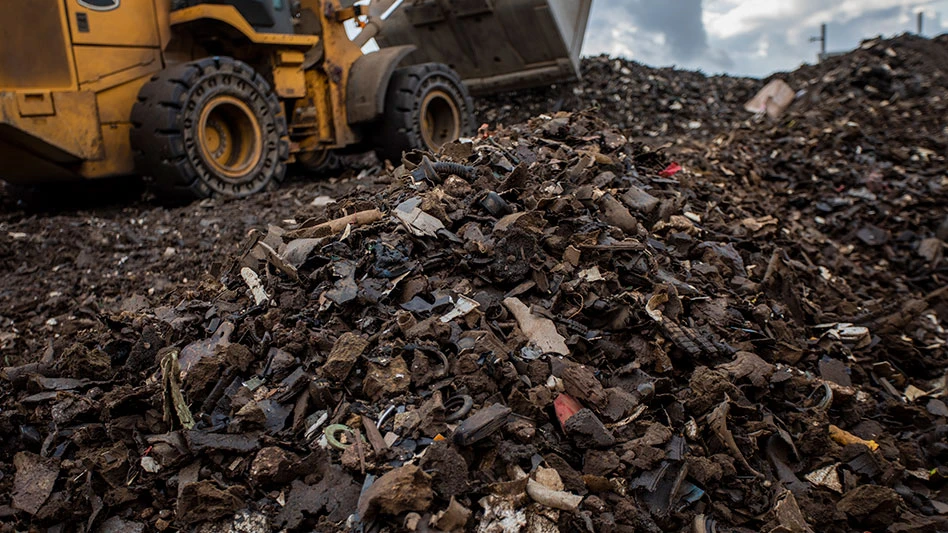
Photo courtesy of Eastman
A collaborative closed-loop recycling project for automotive mixed plastic waste has achieved positive results, demonstrating plastic recycling from end-of-life vehicle shredder byproduct.
Several companies collaborated on the project, including Kingsport, Tennessee-based Eastman, the United States Automotive Materials Partnership LLC (USAMP), Holland, Michigan-based Padnos and global automotive interior supplier Yanfeng.
When automobiles are at the end of their life, metals, tire and glass account for 80 percent to 90 percent of the materials that can be recycled through traditional mechanical recycling streams. The other 10 percent to 20 percent, referred to as auto shredder residue (ASR), consists of mixed plastic and other nonrecycled materials that traditionally end up in landfills or are recovered through waste-to-energy technologies.
RELATED: Cutting through the fluff
Eastman announced the project in July 2021 with plans to conduct research for about 15 months after the project launched that month. Padnos supplied a plastic-rich fraction of ASR as a sustainable feedstock to Eastman’s carbon renewal technology (CRT). Eastman says it has successfully demonstrated addition and conversion of that ASR feedstock into a synthesis gas, which is subsequently used downstream in the production of its polyester and cellulosic thermoplastics. The resins from this production process were further formulated and then supplied to Yanfeng.
According to Eastman, the parts molded by Yanfeng for demonstration were tested to meet original equipment manufacturer requirements for Ford, GM and Stellantis, demonstrating proof of concept for a circular solution.
Eastman says the study proved the feasibility of its CRT, a molecular recycling technology that can break down plastic-rich ASR into molecular building blocks. By recycling complex plastics in CRT, Eastman says it can replace fossil-based feedstock and create polymers without compromising performance for use in new automotive applications.
Steven Crawford, executive vice president of manufacturing and chief sustainability officer at Eastman, says this project serves as an example of how collaboration across the value chain is essential for material circularity.
“Modern cars are made with approximately 50 percent plastics by volume, on average, and this number is only expected to increase as automotive manufacturers continue to seek lighter electric vehicles,” Crawford says. “We’re demonstrating a future where automotive hard-to-recycle plastics and fibers are diverted from landfills and recycled to produce new automotive parts.”
According to an Eastman spokesperson, Eastman plans to work independently with USAMP original equipment manufacturers to implement the closed-loop recycling concept into production applications.
“The collaboration on this project is indicative of the work that is needed to create closed-loop and circular economy solutions,” says Kari Bliss, principal of sustainability at Padnos. “Our purpose statement is on full display with this project—to continue to find ways to innovate, lead and make a positive impact in this world. We are proud to be the mechanical recycler involved in this complex endeavor, which is the first of its kind in North America.”
Jeff Stout, executive director of global innovation at Yanfeng, adds that Yanfeng sees potential with the resin developed during this project.
“We are pleased with the performance of the interior components we molded during the study and believe it would be a sustainable solution in production,” he says.
In addition to diverting waste from landfills, USAMP, a subsidiary of the United States Council for Automotive Research LLC (USCAR), also sees potential for energy savings and reduced overall greenhouse gas emissions by applying this method.
“We are encouraged by the initial results of this study,” USCAR Executive Director Warwick Stirling says. “Innovative processes that enable ASR to be used in automotive parts can help bring us closer to more fully recycling end-of-life vehicles and enabling the possibility of a truly circular economy.”
Latest from Recycling Today
- Vermeer announces plan to build new facility in Des Moines metro area
- PureCycle, Toppan partner on packaging containing PCR
- LKQ to focus on simplification, productivity in uncertain demand environment
- Supreme Court strikes down IEEPA tariffs
- Redwood expands San Francisco R&D footprint
- Constellium posts record Q4 adjusted EBITDA
- QCC torches include customizable features
- Umicore finishes 2025 with increased earnings





